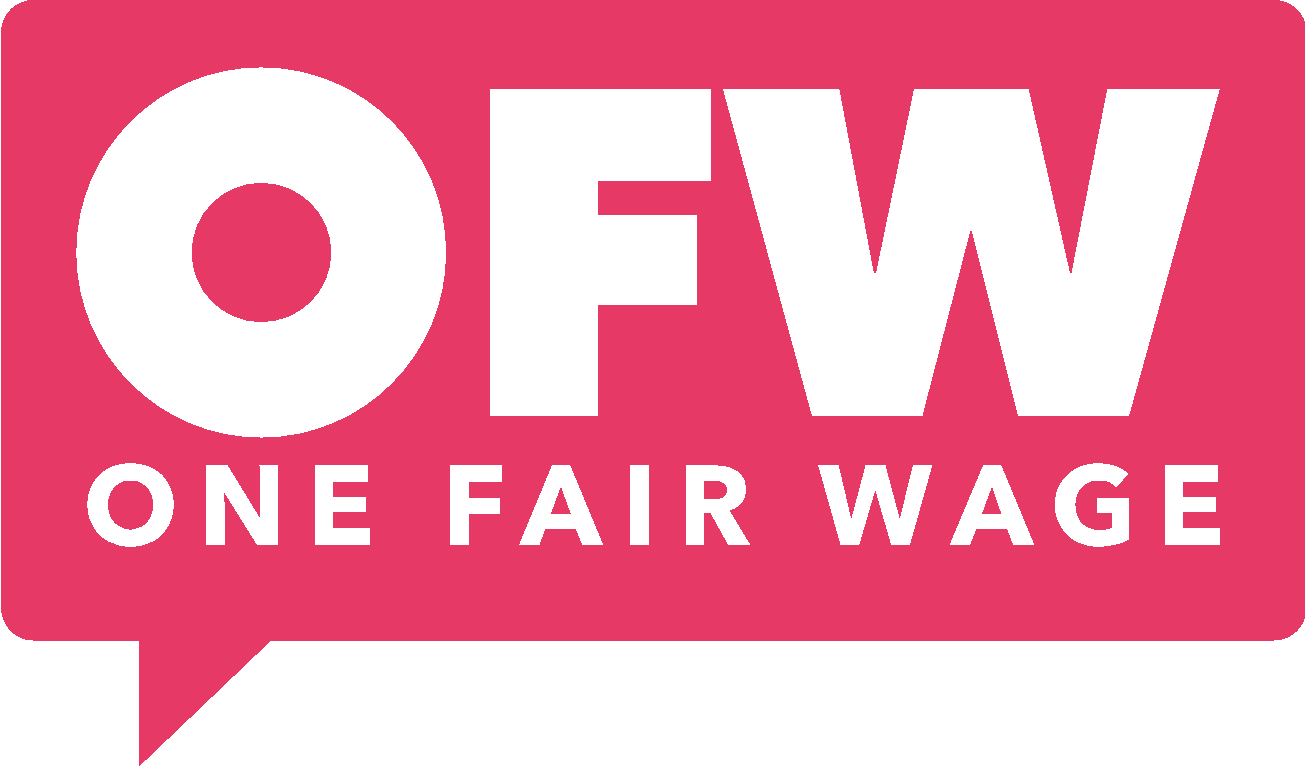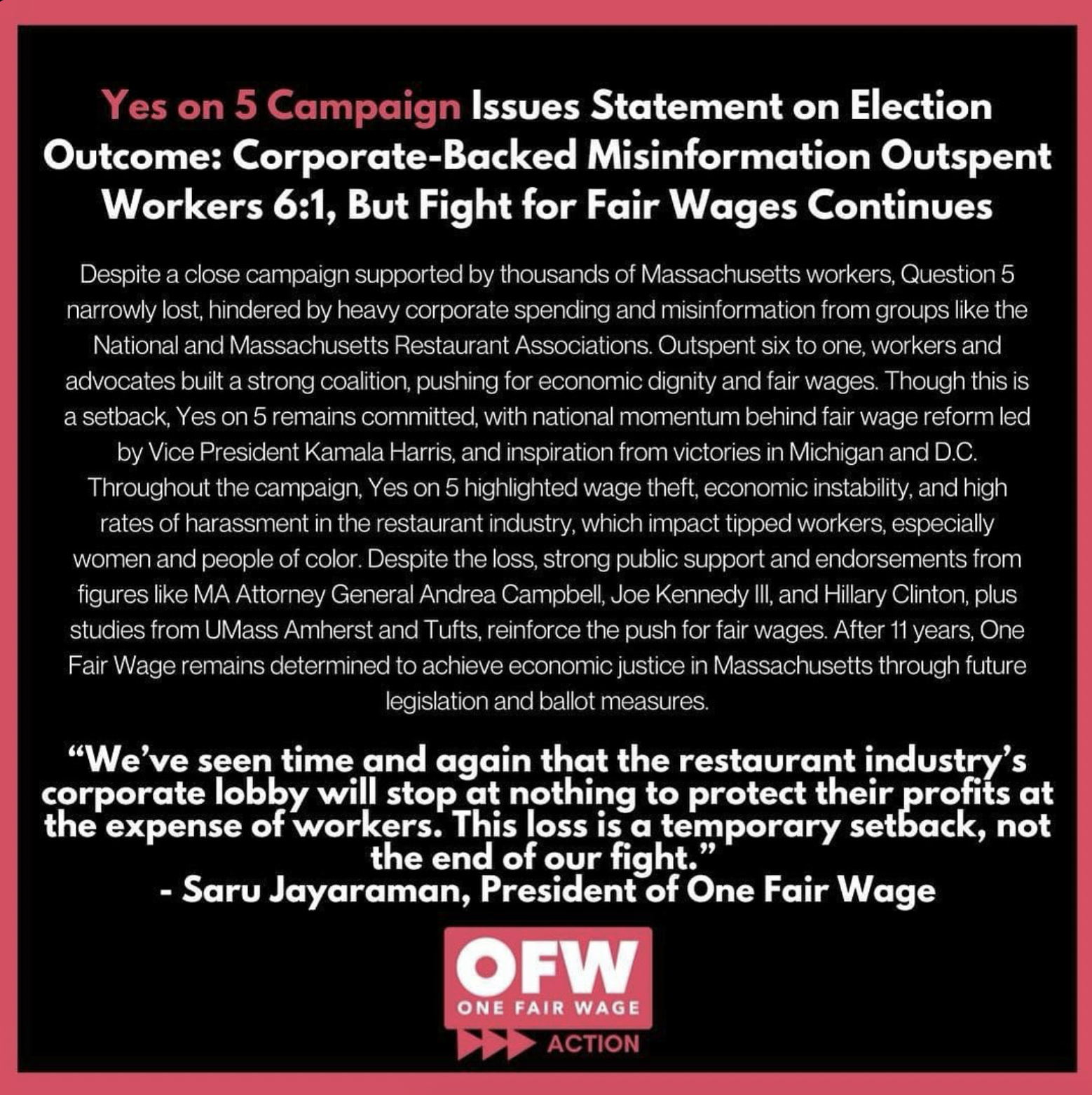One Fair Wage pushes through to the ballot amidst backlash from service workers:
BOSTON– Come November 5, 2024, residents in Massachusetts will vote on key issues of concern for the state. Questions One through Five cover anything from MCAS to psychedelics, however a yes vote on Question Five may change the fabric of Massachusetts forever, especially if you enjoy going out to eat.
In a vote to approve Question Five, tipped service workers in Massachusetts will earn the state’s minimum wage instead of the tipped minimum wage. Currently, the state minimum wage in Massachusetts is $15 per hour while the tipped minimum wage is $6.75. According to Indeed, a career recruitment website, reports from over 1,000 submissions, that server salary in Massachusetts is an average of $22.23 per hour. This is because of the tips balancing their pay. A vote no on this question will keep things the way that they are now.
It will not be a rapid, overnight change to every restaurant in Massachusetts. Instead, the state will begin by implementing 64% of the state minimum wage in January of 2025. Subsequently, every following January will raise the minimum wage for tipped workers as follows: 73% in 2026, 82% in 2027, 91% in 2028, and finally 100% in 2029. Not one person responded for comment on the side in support of the question. However, from the One Fair Wage Plus Tips website, and according to spokesperson for Committee to Protect Tips, Chris Keohan,
“By Massachusetts law, every server and bartender, every tipped employee had to make $15 per hour once you consider tips and wages. If they don’t, it’s the responsibility of the owner or the manager to get you to the full $15 minimum wage,” says Keohan. Keohan is a lobbyist and founder of Shawmut Strategies Group and CK Strategies (Consulting firm dealing with government relations). He notes that his interest in this side of the question, the vote against, comes from his close work with the Hospitality Workers Union. When asked about more of the economic side of this question playing out in the case that it does pass, he says,
“We can see what the first year implementation looks like down in Washington DC. What’s happened is over 4,000 jobs have been lost out of 30,000. There is automation being added which means restaurants are going from full service to what’s considered quick service… Over 76% of restaurants have now implemented service fees down in DC, and that’s exactly what’s going to happen up here,” Keohan remarks.
Food service professionals are also looking at this question and the effects it will have on their livelihood. Dylan Cavaliere is a manager at the premium waterfront oyster bar, Cru, on Nantucket Island. Cavaliere has been working in the food service and hospitality industry since he was 16-years- old. His concerns with Question 5 lay how gratuity moves in the new system and what the menu will look like after the changes:
“The passing of the bill would allow business owners to withhold any additional gratuity completely and then it’s their decision how the tips are pooled. I feel like the employees are bound to be disappointed in that. The price for goods, menu items and the costs that will go up progressively will kind of scare off a clientele that’s already reluctant to dine out,” says Cavaliere. And when asked about how the bill will affect a tourist economy like Nantucket, he says,
“I think the local, year-round community will suffer the most. That’s the audience that’s already reluctant to dine out because of the prices and the cost of everything… No one that I know that is a hospitality professional or has been doing it for a long time finds the system broken. I mean, it’s not perfect, and nothing is, but it’s not broken either,” he muses.
Chris Sleeper is a fellow resident of Nantucket, and founder and co-owner of Pip and Anchor, a local market housing sustainably sourced artisanal goods from New England. Pip and Anchor brings high quality ingredients to the hands of locals, as well as espresso products and food prepared in house. What sets Sleeper’s motivations apart though, is that Pip and Anchor operate on a gratuity free policy. Instead of gratuity for staff, one is able to instead leave a donation for the shop's contributions to Nourishing Nantucket, a food insecurity program that sends boxes of quality, fresh food to families in need.
In terms of Question Five, Sleeper saw how tips affect staff wages by staying open year-round in a tourist-dependent economy;
“We saw inconsistencies in the tips. So a server that would make a massive amount of money in a week in August would not make that same amount of money in a week in February… So we wanted a consistency of wages. We thought it would lead to better return rate for staff, then we would grow together… We’re trying to be an example of maybe how it could work in a smaller cafe style setting that also does retail,” Sleeper remarks. In describing the importance of caring for his team and having wages reflect that, Sleeper described that an open and honest dialogues is very important.
“We’re very open about our finances, and if someone did have a question about their wages, we would open the books and say, ‘ Hey, this is where we’re at. We want to get here. Let's all work together,” he says.
This seems to be an example of what Question Five aims to promote; honest communication with employers and a level of trust that allows for employees to work with their senior staff to make their work work for them. Sleeper sees that his case is a model of success, but that the rest of the world might not be so ready yet,
“There have been people who have tried it and failed in a restaurant style setting and it’s unfortunate because I would love for it to work but we’re not there yet. I think that’s one of my biggest problems with Question Five is that it’s too fast. Speaking as someone who does not accept gratuity against that question should say it all,” he says.
He finally notes that this question passing might not be the best in terms of fostering creativity in the art of food service and preparing a meal, or for passionate owners of small businesses to break into the scene,
“If we want the successful restaurants in our restaurant businesses to be Applebees, 99, and Chilis, that would be fantastic… we would have amazing service at those bigger chain restaurants, which I'm not saying i don't get amazing service at those, they’re great for what they are,” Sleeper says. He also mentions that those who want to open a business on their own account are committing to debt in the tradeoff of seeing their passion become alive.
Yes Vote (according to Secretary of the Commonwealth of Massachusetts):
“Increase the minimum hourly wage an employer must pay a tipped worker to the full state minimum wage implemented over five years, at which point employers could pool all tips and distribute them to all non-management workers.”
No Vote (according to Secretary of the Commonwealth of Massachusetts):
“Makes no change in the law governing tip pooling or the minimum wage for tipped workers.”
Saru Jayaraman — President of One Fair Wage Plus Tips
Chris Keohan — Spokesperson for the Committee to Protect Tips








One Fair Wage swept by Committee to Protect Tips in a majority vote:
BOSTON – Opponents of Massachusetts Ballot Question 5 are celebrating a win on preserving the current state minimum wage for tipped workers. In November’s election, One Fair Wage proposed a bill that would raise the tipped minimum wage for workers up to $15 per hour, over four years. The Committee to Protect Tips was campaigning against this group.
This ballot measure was defeated in a majority, and according to Bloomberg, 1.1 million votes were cast in support of the bill passing and 2.1 million in opposition of the bill passing. This means that 64 percent of voters opposed the motion to leave behind sub-minimum wage for tipped workers.
One Fair Wage issued a statement after the election, claiming it was hindered by big corporate spending and the spread of misinformation from the other side. They go further to say that they were,
“Outspent six to one… Though this is a setback, Yes on 5 remains committed, with national momentum behind fair wage reform led by Vice President Harris, and inspiration from victories in Michigan and D.C.”
Spokesperson for the no sides of Questions 4 and 5, Chris Keohan, did not follow up personally with comment about how the election went although both campaigns went in his favor. He did take to NBC Boston to describe some of his accomplishments regarding the Question 5 campaign.
“We listened to the fears that people had, what they wanted to talk about. People just want to feel heard. That’s the number one reason why there’s so much anger right now, they don’t feel heard.”
Restaurants all across Boston were seen sporting “No on 5” gear in the weeks leading up to elections, which was in part a tactic employed by the no campaign, but also in part by the people working and managing in restaurants themselves.
Graphic made in Flourish, screenshots from OFW Instagram and CTPT X accounts.






